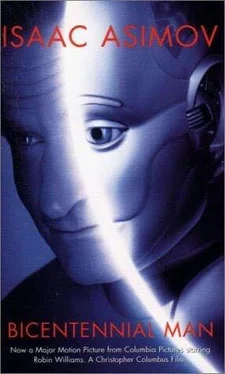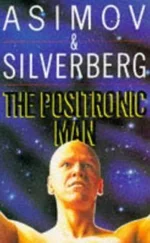Isaac Asimov - The Bicentennial Man and Other Stories
Здесь есть возможность читать онлайн «Isaac Asimov - The Bicentennial Man and Other Stories» весь текст электронной книги совершенно бесплатно (целиком полную версию без сокращений). В некоторых случаях можно слушать аудио, скачать через торрент в формате fb2 и присутствует краткое содержание. Год выпуска: 1976, ISBN: 1976, Издательство: Doubleday science fiction, Жанр: Фантастика и фэнтези, на английском языке. Описание произведения, (предисловие) а так же отзывы посетителей доступны на портале библиотеки ЛибКат.
- Название:The Bicentennial Man and Other Stories
- Автор:
- Издательство:Doubleday science fiction
- Жанр:
- Год:1976
- ISBN:ISBN: 0-385-12198-9
- Рейтинг книги:4 / 5. Голосов: 1
-
Избранное:Добавить в избранное
- Отзывы:
-
Ваша оценка:
- 80
- 1
- 2
- 3
- 4
- 5
The Bicentennial Man and Other Stories: краткое содержание, описание и аннотация
Предлагаем к чтению аннотацию, описание, краткое содержание или предисловие (зависит от того, что написал сам автор книги «The Bicentennial Man and Other Stories»). Если вы не нашли необходимую информацию о книге — напишите в комментариях, мы постараемся отыскать её.
The Bicentennial Man and Other Stories — читать онлайн бесплатно полную книгу (весь текст) целиком
Ниже представлен текст книги, разбитый по страницам. Система сохранения места последней прочитанной страницы, позволяет с удобством читать онлайн бесплатно книгу «The Bicentennial Man and Other Stories», без необходимости каждый раз заново искать на чём Вы остановились. Поставьте закладку, и сможете в любой момент перейти на страницу, на которой закончили чтение.
Интервал:
Закладка:
Janek said, “I know you have been trying to reach me for some weeks now. I’m sorry for the delay. I hope you understand that my time is not entirely my own. However, we’re here now. . . . I have referred to the Chief of the Service, by the way, and he gave you very high marks. He regrets your resignation.”
Edwards said, eyes downcast, “It seemed better to carry on my investigations without danger of embarrassment to the Service.”
Janek’s smile flashed. “Your activities, though discreet, have not gone unnoticed, however. The Chief explains that you have been investigating the Tercentenary Incident, and I must admit it was that which persuaded me to see you as soon as I could. You’ve given up your position for that? You’re investigating a dead issue.”
“How can it be a dead issue, Mr. Janek? Your calling it an Incident doesn’t alter the fact that it was an assassination attempt.”
“A matter of semantics. Why use a disturbing phrase?”
“Only because it would seem to represent a disturbing truth. Surely you would say that someone tried to kill the President.”
Janek spread his hands. “If that is so, the plot did not succeed. A mechanical device was destroyed. Nothing more. In fact, if we look at it properly, the Incident—whatever you choose to call it—did the nation and the world an enormous good. As we all know, the President was shaken by the Incident and the nation as well. The President and all of us realized what a return to the violence of the last century might mean and it produced a great turnaround.”
“I can’t deny that.”
“Of course you can’t. Even the President’s enemies will grant that the last two years have seen great accomplishments. The Federation is far stronger today than anyone could have dreamed it would be on that Tercentenary day. We might even say that a breakup of the global economy has been prevented.”
Edwards said cautiously, “Yes, the President is a changed man. Everyone says so.”
Janek said, “He was a great man always. The Incident made him concentrate on the great issues with a fierce intensity, however.”
“Which he didn’t do before?”
“Perhaps not quite as intensely. . . . In effect then, the President, and all of us, would like the Incident forgotten. My main purpose in seeing you, Mr. Edwards, is to make that plain to you. This is not the Twentieth Century and we can’t throw you in jail for being inconvenient to us, or hamper you in any way, but even the Global Charter doesn’t forbid us to attempt persuasion. Do you understand me?”
“I understand you, but I do not agree with you. Can we forget the Incident when the person responsible has never been apprehended?”
“Perhaps that is just as well, too, sir. Far better that some, uh, unbalanced person escape than that the matter be blown out of proportion and the stage set, possibly, for a return to the days of the Twentieth Century.”
“The official story even states that the robot spontaneously exploded—which is impossible, and which has been an unfair blow to the robot industry.”
“A robot is not the term I would use, Mr. Edwards. It was a mechanical device. No one has said that robots are dangerous, per se, certainly not the workaday metallic ones. The only reference here is to the unusually complex manlike devices that seem flesh and blood and that we might call androids. Actually, they are so complex that perhaps they might explode at that; I am not an expert in the field. The robotics industry will recover.”
“Nobody in the government,” said Edwards stubbornly, “seems to care whether we reach the bottom of the matter or not.”
“I’ve already explained that there have been no consequences but good ones. Why stir the mud at the bottom, when the water above is clear?”
“And the use of the disintegrator?”
For a moment, Janek’s hand, which had been slowly turning the container of soya sticks on his desk, held still, then it returned to its rhythmic movement. He said lightly, “What’s that?”
Edwards said intently, “Mr. Janek, I think you know what I mean. As part of the Service—”
“To which you no longer belong, of course:”
“Nevertheless, as part of the Service, I could not help but hear things that were not always, I suppose, for my ears. I had heard of a new weapon, and I saw something happen at the Tercentenary which would require one. The object everyone thought was the President disappeared into a cloud of very fine dust. It was as though every atom within the object had had its bonds to other atoms loosed. The object had become a cloud of individual atoms, which began to combine again of course, but which dispersed too quickly to do more than appear a momentary glitter of dust.”
“Very science-fictionish.”
“I certainly don’t understand the science behind it, Mr. Janek, but I do see that it would take considerable energy to accomplish such bond breaking. This energy would have to be withdrawn from the environment. Those people who were standing near the device at the time, and whom I could locate—and who would agree to talk—were unanimous in reporting a wave of coldness washing over them.”
Janek put the soya-stick container to one side with a small click of transite against cellulite. He said, “Suppose just for argument that there is such a thing as a disintegrator.”
“You need not argue. There is.”
“I won’t argue. I know of no such thing myself, but in my office, I am not likely to know of anything so security-bound as new weaponry. But if a disintegrator exists and is as secret as all that, it must be an American monopoly, unknown to the rest of the Federation. It would then not be something either you or I should talk about. It could be a more dangerous war weapon than the nuclear bombs, precisely because—if what you say is so—it produces nothing more than disintegration at the point of impact and cold in the immediate neighborhood. No blast, no fire, no deadly radiation. Without these distressing side effects, there would be no deterrent to its use, yet for all we know it might be made large enough to destroy the planet itself.”
“I go along with all of that,” said Edwards.
“Then you see that if there is no disintegrator, it is foolish to talk about one; and if there is a disintegrator, then it is criminal to talk about one.”
“I haven’t discussed it, except to you, just now, because I’m trying to persuade you of the seriousness of the situation. If one had been used, for instance, ought not the government be interested in deciding how it came to be used—if another unit of the Federation might be in possession?”
Janek shook his head. “I think that we can rely on appropriate organs of this government to take such a thing into consideration. You had better not concern yourself with the matter.”
Edwards said, in barely controlled impatience, “Can you assure me that the United States is the only government that has such a weapon at its disposal?”
“I can’t tell you, since I know nothing about such a weapon, and should not know. You should not have spoken of it to me. Even if no such weapon exists, the rumor of its existence could be damaging.”
“But since I have told you and the damage is done, please hear me out. Let me have the chance of convincing you that you, and no one else, hold the key to a fearful situation that perhaps I alone see.”
“You alone see? I alone hold the key?”
“Does that sound paranoid? Let me explain and then judge for yourself.”
“I will give you a little more time, sir, but what I have said stands. You must abandon this—this hobby of yours—this investigation. It is terribly dangerous.”
“It is its abandonment that would be dangerous. Don’t you see that if the disintegrator exists and if the United States has the monopoly of it, then it follows that the number of people who could have access to one would be sharply limited. As an ex-member of the Service, I have some practical knowledge of this and I tell you that the only person in the world who could manage to abstract a disintegrator from our top-secret arsenals would be the President. . . . Only the President of the United States, Mr. Janek, could have arranged that assassination attempt.”
Читать дальшеИнтервал:
Закладка:
Похожие книги на «The Bicentennial Man and Other Stories»
Представляем Вашему вниманию похожие книги на «The Bicentennial Man and Other Stories» списком для выбора. Мы отобрали схожую по названию и смыслу литературу в надежде предоставить читателям больше вариантов отыскать новые, интересные, ещё непрочитанные произведения.
Обсуждение, отзывы о книге «The Bicentennial Man and Other Stories» и просто собственные мнения читателей. Оставьте ваши комментарии, напишите, что Вы думаете о произведении, его смысле или главных героях. Укажите что конкретно понравилось, а что нет, и почему Вы так считаете.












